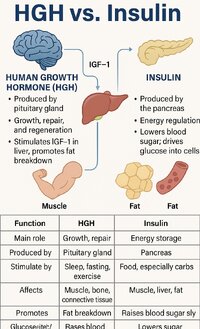Human Growth Hormone (HGH) and Insulin are two of the most powerful anabolic hormones in the human body, yet they serve very different masters.
While both promote growth and energy balance, they work through distinct biological systems, one builds tissue, the other manages nutrients.

Human Growth Hormone (HGH)
Produced by the pituitary gland, HGH is released in pulses during deep sleep, fasting, and intense exercise. Its main mission is growth, repair, and regeneration.
HGH stimulates the liver to produce IGF-1 (Insulin-like Growth Factor 1), which triggers muscle, bone, and connective tissue growth. It also enhances fat breakdown (lipolysis) for fuel.
Key effects:
*Increases lean muscle mass
*Enhances recovery and collagen synthesis
*Promotes fat utilization for energy
*Slightly elevates blood glucose by reducing insulin sensitivity
Insulin
Produced by the pancreas, insulin is released when blood glucose rises, especially after eating carbohydrates.
Its primary function is energy regulation. Insulin acts as a key, unlocking cells to absorb glucose, amino acids, and fatty acids for energy or storage. It is both anabolic (promotes growth) and anti-catabolic (prevents breakdown).
Key effects:
*Drives nutrients into muscle and liver cells
*Promotes glycogen and fat storage
*Lowers blood glucose levels
*Inhibits fat breakdown
Comparison Chart:
Role HGH Insulin
In summary,
HGH is the architect, constructing and repairing tissues, while insulin is the supplier, managing the body’s energy and nutrient flow.
Both are essential for balance, too little of either impairs growth and recovery, too much (especially artificially) can cause serious metabolic and cardiac complications.
Isaac J. Hall II
IFBB Pro
While both promote growth and energy balance, they work through distinct biological systems, one builds tissue, the other manages nutrients.

Human Growth Hormone (HGH)
Produced by the pituitary gland, HGH is released in pulses during deep sleep, fasting, and intense exercise. Its main mission is growth, repair, and regeneration.
HGH stimulates the liver to produce IGF-1 (Insulin-like Growth Factor 1), which triggers muscle, bone, and connective tissue growth. It also enhances fat breakdown (lipolysis) for fuel.
Key effects:
*Increases lean muscle mass
*Enhances recovery and collagen synthesis
*Promotes fat utilization for energy
*Slightly elevates blood glucose by reducing insulin sensitivity
Insulin
Produced by the pancreas, insulin is released when blood glucose rises, especially after eating carbohydrates.
Its primary function is energy regulation. Insulin acts as a key, unlocking cells to absorb glucose, amino acids, and fatty acids for energy or storage. It is both anabolic (promotes growth) and anti-catabolic (prevents breakdown).
Key effects:
*Drives nutrients into muscle and liver cells
*Promotes glycogen and fat storage
*Lowers blood glucose levels
*Inhibits fat breakdown
Comparison Chart:
Role HGH Insulin
| Main Role | Growth, repair | Energy storage |
| Produced By | Pituitary gland | Pancreas |
| Stimulated By | Sleep, fasting, exercise | Food, especially carbs |
| Affects | Muscle, bone, connective tissue | Muscle, liver, fat |
| Promotes | Fat breakdown | Nutrient storage |
| Glucose Effect | Raises blood sugar | Lowers blood sugar |
In summary,
HGH is the architect, constructing and repairing tissues, while insulin is the supplier, managing the body’s energy and nutrient flow.
Both are essential for balance, too little of either impairs growth and recovery, too much (especially artificially) can cause serious metabolic and cardiac complications.
Isaac J. Hall II
IFBB Pro
Last edited:



